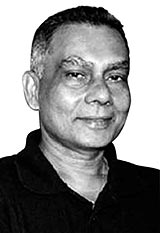 |
 |
Nihal Silva
I was in China when the mines
exploded in Wilpattu. Upsetting though the news was in a general sense, it had
that anonymous quality that allows one’s mind to skim over the actual
consequences to individuals.
So too, in the terrible massacres of servicemen that have taken place in the
last few months, my sorrows were unfocused, until just before I left for China.
Then I had received a message that, amongst those shot at Omanthai, on I think
the 19th of May, was one of my students at the Sri Lanka Military Academy. I had
in fact seen him a week previously, when he appeared for a viva on his project,
a dark slight young man who will now stay etched in my mind forever as the first
to be killed in conflict of those who followed our degree course.
Two weeks later, just before I left China, I found out that amongst the victims
of the Wilpattu mines was Nihal de Silva. I cannot claim to have known him, but
I had of course heard of his book when he won the Gratiaen Prize a few years
back. Last year, my staff at the Ministry, two former students who realized I
was getting increasingly irritable at our halting progress in face of
bureaucratic delays, decided I needed to be soothed by some good books. They
gave me The Road from Elephant Pass and The Far Spent Day, both of which were
impossible to put down.
I believe they did improve my temper, though initially one would not have
thought of them as soothing. Later Tara de Mel said that she went to the
Gratiaen Awards Ceremony in the hope of meeting him, since his third novel, The
Ginirella Conspiracy, seemed to her to encapsulate the problems in the
university sector that she had found so depressing. Though I had my own latest
novel in contention, I was convinced he would win the Gratiaen Prize, since his
writing seemed to me to exemplify what a good novel needs: there is an
illuminating dose of social criticism, but it is throughout intermingled with
vivid characterization, racy narratives and romance, all presented through a
compelling plot and simple, striking language.
I am not ashamed of my own subtle complexities, but I have no illusions about
what makes for popular and readily readable fiction. And what struck me about
Nihal de Silva is that, while ensuring that his novels would be read widely, he
tackled subjects of great contemporary significance – the ethnic conflict,
political violence, educational inadequacies - with understanding and humanity.
This last emerged in particular through the theme that recurred throughout his
work, which his publisher, Vijitha Yapa has characterized so succinctly as
‘reconciliation… leaving aside past bitterness and hate for the sake of the
future’.
Given such ideals, the circumstances of his death were particular moving. It is
not only that he died in Wilpattu, which figures as almost a character in his
writing. It was also that, amongst the friends who died along with him, there
was a Tamil who exemplified the plurality he manifested, as well as the unity of
different races displayed in The Road from Elephant Pass against the dangers
from wild life and from far more dangerous men.
For those who have not read it, I should note that the book is a spellbinding
adventure about a Sinhalese Sri Lankan army officer escorting a Tamil girl down
to Colombo from the north. Much of the novel is set in Wilpattu, with moving
evocations of the landscape and its birds and animals, and chilling accounts of
the dangers from terrorists as well as army deserters, far less predictable than
the animals.
But equally compelling are the discussions and disputes which present different
perspectives on the ethnic crisis the country faces, which the pair engage in as
they move southward, and fall tempestuously in love. The army officer learns,
without ever moving towards indulgence of the Tigers or of terrorism, how Tamils
have suffered discrimination and humiliation over the years, particular in the
vicious government led assault on them in 1983, and therefore how important it
is to recompense them morally as well as constitutionally.
I see Nihal de Silva then as quintessentially Sri Lankan, a Sinhalese Catholic
who had grown up with Tamil and Buddhist friends before political manipulations
on all sides led to the bitterness of which he and his friends were victims. He
maintained old friendships, as is clear from the list of those who died with
him. One of the obituaries noted his regret that his children had not had
similar opportunities to make friends readily with those of different
communities.
Now that the forces of darkness are once again on the warpath against English
medium, I hope the Ministry of Education will not only prevent children being
straitjacketed again into monolingual enclaves, but also actively develop the
concept of Amity Schools that was started in 2001. But one wonders. Nihal de
Silva, a man of intelligence and creative integrity, has fallen victim to
ruthless terrorism. Though one would like to think that the spirit of compromise
and plurality which he manifested in his novels is a truer representation of the
island he loved so dearly, I cannot also help recalling Richard de Zoysa’s
account, many years ago, of another visit to another game park –
For once you’ve seen man on the kill
The spotted hunter fails to thrill
Yes, man’s a splendid predatory
Beast – with a fine hereditary
Chauvinistic sense of smell
And hunter’s eye he claims can tell
The subtle shades of class or race
That doom the quarry to the chase
But Man, quite unlike beasts, in lots
Of instances CAN CHANGE HIS SPOTS…
Let nature do the worst it can
Best quarry for Mankind is Man